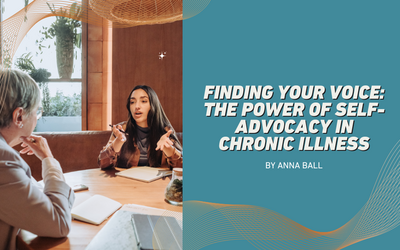
By Anna Ball
It’s back to school, back to work, and back to “everything happening so fast” season. As a new graduate student starting a new semester, there are plenty of changes, obligations, challenges and opportunities that I am facing. As someone with chronic illness, I’m also balancing the responsibilities of being a patient – doctors’ appointments, extended breaks, updated medical routines, renewing medications. But the most important obligation is not overly stressing myself out and causing a flare up.
As I reflect during this time, I often think about how difficult this season can be for self-advocacy. Self-advocacy involves understanding your strengths and challenges, being aware of personal needs and preferences, and effectively communicating these to others. This is an important skill that I’m still learning how to fine tune. Having to explain my health needs and how they impact my life and my education is challenging. As a young adult, chronic disease patient or not, I have often found myself in situations where I have been afraid to speak up for myself. Afraid of being seen as too mean or afraid of letting others down for setting boundaries for myself and my health.
The good news is it does get easier. The more you communicate your expectations and needs, such as requesting accommodations at school or taking time away from socializing with friends due to a flare up, the more confident you become. The more confident you are, the more energy you have and the less likely you are to experience burnout. As the old saying goes, you cannot pour from an empty cup.
There are several things I’ve learned from self-advocacy over the years:
- Finding balance. I have a very busy life, professionally, academically and socially as many young people do. Before I learned how to self-advocate, my work/life balance was very uneven. If didn’t speak up or set boundaries at school such as not pulling all-nighters and not taking on additional projects, I was more prone to getting sick. This left me unable to participate in the things I enjoy in my personal and professional lives.
- Identifying my needs and my non-negotiables. Self-advocacy taught me how to identify my needs. I used to self-sacrifice in my work, my relationships and in school to overcompensate for the energy my chronic illnesses often take from me. This was not a healthy way to live. Figuring out my non-negotiables, the things I need to live a healthy and stress-free lifestyle, has been so helpful in reducing flares of my illness.
- Reframing my mindset. Stepping away from or stepping down from responsibilities due to illness often feels like failing, quitting or letting people down. Sometimes stepping away from a stressful situation, whether temporarily or permanently, is the best thing you can do for yourself and your health. I’ve found that reframing these situations from failures to a fresh start has been very helpful.
Anna is currently a student pursuing a second master’s degree in special education. She is also working toward her certification and licensure in reading intervention, special education and elementary education.